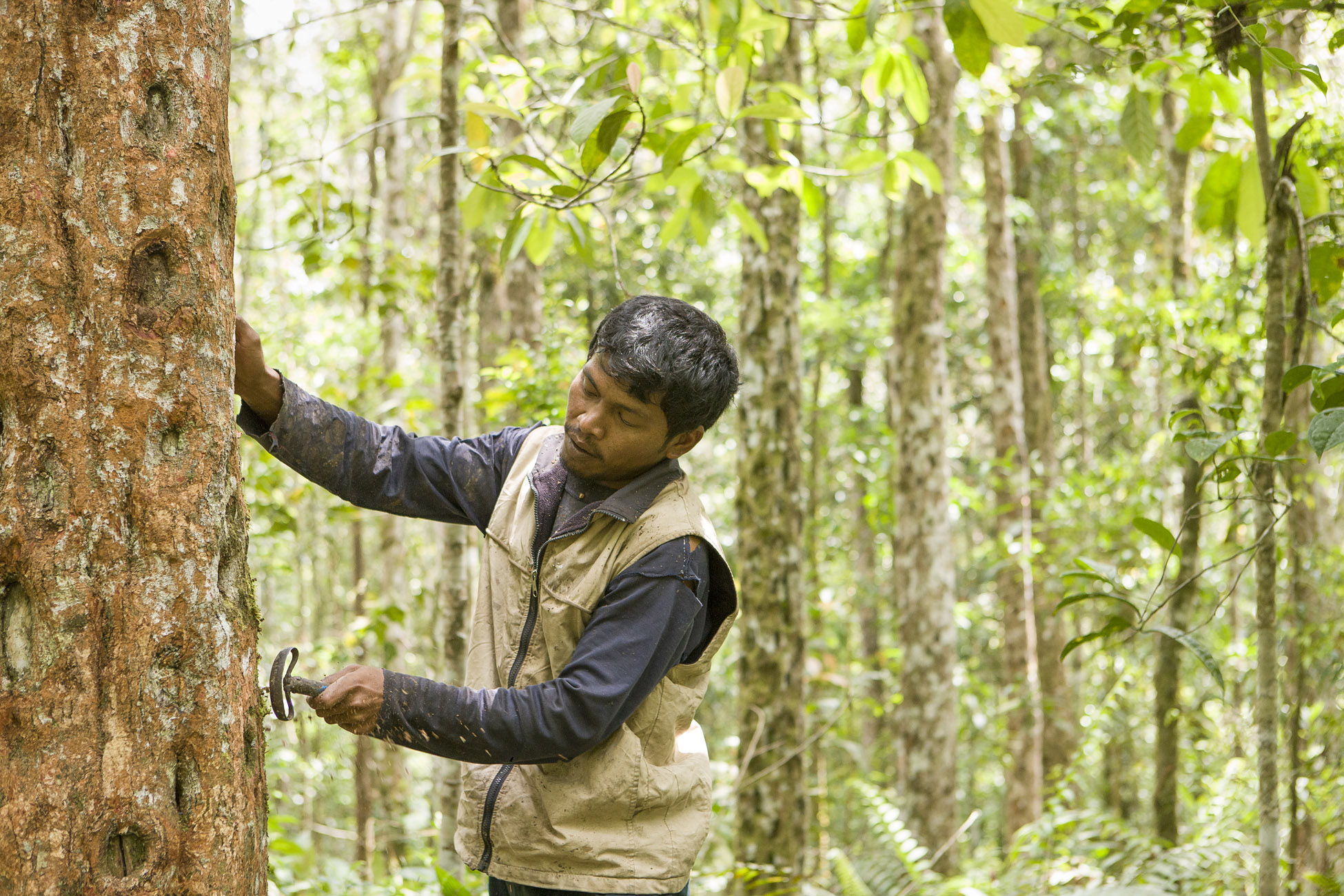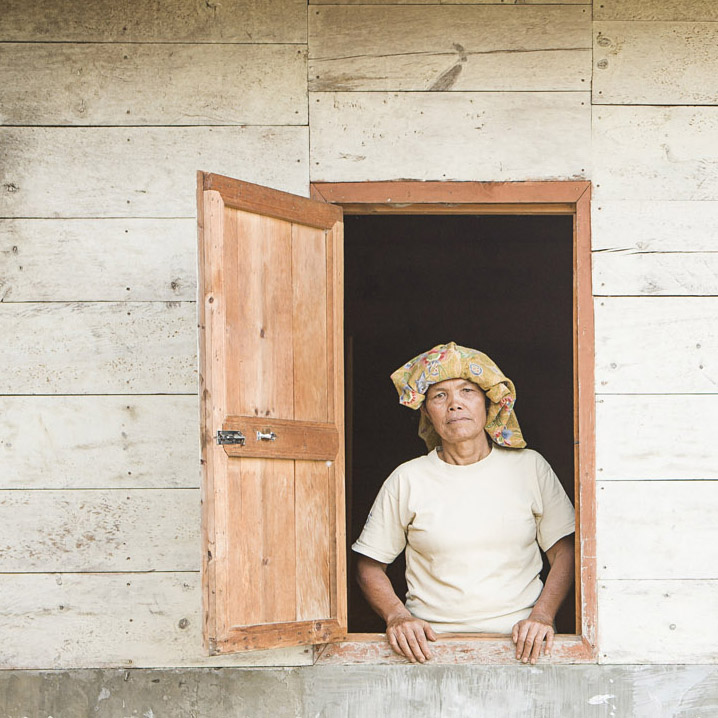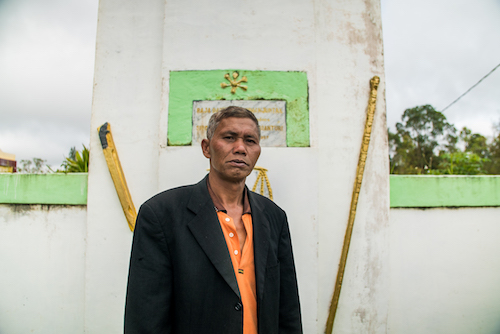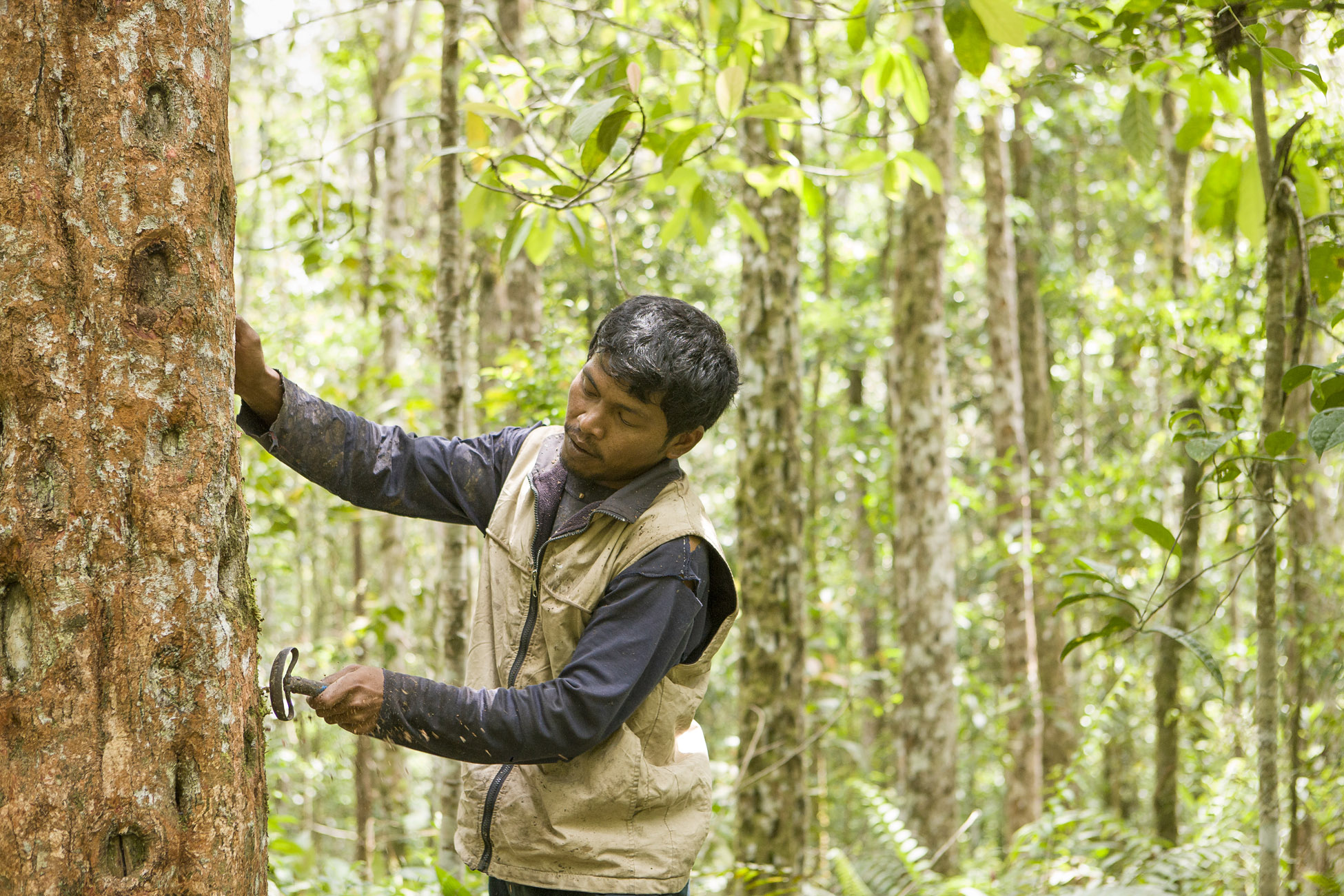In Indonesia, and across the world, the fight for land rights is the fight for the forests and the climate. For communities impacted by Toba Pulp Lestari (TPL)—Indonesia’s largest producer of pulp for fabric—the struggle for land rights and environmental conservation has been one and the same.
For generations, Indigenous Batak communities have planted benzoin trees in their traditionally-owned forests and have sustainably harvested the trees’ fragrant resin. This culturally significant practice is often a primary source of cash income. Benzoin resin is sold internationally and the money helps many farmers pay for education, travel, and health care, including sending their children to college.
 The benzoin is the source of our life…It is the source of our livelihood and allows us to send our children to school. So we strongly objected when Toba Pulp Lestari (TPL) cleared the forest…We continue to…fight for our land.” – Kersi Sihite, Pandumaan-Sipituhuta, North Sumatra, Indonesia. (Photo credit: Credit: Joel Redman / If Not Us Then Who?). Learn more
The benzoin is the source of our life…It is the source of our livelihood and allows us to send our children to school. So we strongly objected when Toba Pulp Lestari (TPL) cleared the forest…We continue to…fight for our land.” – Kersi Sihite, Pandumaan-Sipituhuta, North Sumatra, Indonesia. (Photo credit: Credit: Joel Redman / If Not Us Then Who?). Learn more
In fact, over 1.6 billion people across the globe depend on healthy forests for their lives and livelihoods.1 Studies have found that tropical forests provide almost one third of household environmental income2 for forest based peoples.3 Aside from essential cash income, forests also provide clean water, shelter, medicine, and food. Forests provide a critical source of nutritious food for forest based peoples.4 In short, when TPL clearcuts forests for industrial pulp plantations, it destroys not only a diverse forest, but also the ability of many Indigenous Batak communities to provide for themselves and their families.
 The forest is my hair, the mountain is my head, the water is my blood…it is a human, the same as me. If there’s no longer any forests…in Indonesia, it’s like my head is being all cut off….All forests in Indonesia have to be returned home. Toba Pulp Lestari (TPL) must be stopped.” -Marga Rusmedia Lumban Gaol, Pandumaan-Sipituhuta, North Sumatra, Indonesia. Learn more
The forest is my hair, the mountain is my head, the water is my blood…it is a human, the same as me. If there’s no longer any forests…in Indonesia, it’s like my head is being all cut off….All forests in Indonesia have to be returned home. Toba Pulp Lestari (TPL) must be stopped.” -Marga Rusmedia Lumban Gaol, Pandumaan-Sipituhuta, North Sumatra, Indonesia. Learn more
There is an answer. When communities have legal rights to their lands, and know they will be able to hand it down to their children, they have every incentive to protect it. Across the globe Indigenous and local communities depend on half of the world’s land for their lives and livelihoods, but they only formally own 10% of it.5 In Indonesia alone, 80-95 million people manage their traditionally-owned forests and land, and never used or needed formal legal title to their lands.6 Despite the fact that the rights to traditionally owned land have been recognized within Indigenous and local communities for generations, these rights have not been historically recognized by the Indonesian government. This has become an issue as agricultural plantations seek to expand, and the government has granted land concessions to companies that overlap with the traditionally-owned land of Indigenous and local communities. This has led to widespread land conflicts between hundreds of communities across Indonesia and plantation companies.7
 We implore the government of Indonesia to make Toba Pulp Lestari (TPL) give us back our 2,000 hectares of traditionally-owned land controlled by TPL, because the land is our life, and in Nagasaribu the land is the flesh of our ancestors.” -Toni Simanjuntak, Nagasaribu, North Sumatra, Indonesia. Learn more
We implore the government of Indonesia to make Toba Pulp Lestari (TPL) give us back our 2,000 hectares of traditionally-owned land controlled by TPL, because the land is our life, and in Nagasaribu the land is the flesh of our ancestors.” -Toni Simanjuntak, Nagasaribu, North Sumatra, Indonesia. Learn more
As mentioned earlier, Toba Pulp Lestari (TPL) has a legacy of land conflicts in Indonesia. Due to frontline resistance and the international market pressure TPL adopted a policy in 2015 to end deforestation and respect human rights. However, to this day not enough has changed on the ground, and communities continue to report human rights abuses from TPL. Through our Beyond Paper Promises campaign we are demanding that TPL take action to ensure that traditionally-owned land is removed from its plantations.
Legal acknowledgement of traditional land rights is the best hope we have to resolve these conflicts, protect forests, while at the same time protecting human rights. When communities have legal rights to their traditionally-owned land they have more incentive to protect it. Fortunately, the Indonesian government has begun to recognize Indigenous land rights for the first time in the nation’s history, but there is still a lot of work to be done.
You can help the Indigenous Batak people protect their forests and their livelihoods by signing this petition to Toba Pulp Lestari demanding that it respect human rights and do everything it can to remove traditionally-owned land from its plantations.
- Forest Peoples Programme, Forest Peoples: Numbers Across the World. 2014 http://www.forestpeoples.org/sites/fpp/files/publication/2012/05/forest-peoples-numbers-across-world-final_0.pdf
- CIFOR’s Poverty Environment Network (PEN), Environmental Income and Rural Livelihoods: A Global-Comparative Analysis, 2014, http://www.cifor.org/library/4499/environmental-income-and-rural-livelihoods-a-global-comparative-analysis-2/?pub=4499
- FAO United Nations, National socioeconomic surveys in forestry: Guidance and survey modules for measuring the multiple roles of forests in household welfare and livelihoods, 2016, http://www.fao.org/3/a-i6206e.pdf
- PLoS One, Forests, Trees, and Micronutrient-Rich Food Consumption in Indonesia, 2016, http://www.cifor.org/library/6121/forests-trees-and-micronutrient-rich-food-consumption-in-indonesia/
- Forest Peoples Programme, Livelihoods and forests at increased risk if land rights are ignored, says new report, 2 March, 2016 http://www.forestpeoples.org/topics/rights-land-natural-resources/news/2016/03/livelihoods-and-forests-increased-risk-if-land-rig
- Forest Peoples Programme, Forest Peoples: Numbers Across the World. 2014 http://www.forestpeoples.org/sites/fpp/files/publication/2012/05/forest-peoples-numbers-across-world-final_0.pdf
- The Guardian, Death of an Indonesian farmer: are companies doing enough to protect local communities?, April 1, 2015, https://www.theguardian.com/sustainable-business/2015/apr/01/indonesia-farmer-death-aisa-pulp-paper












